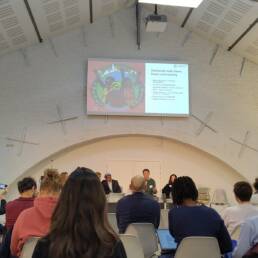author
Luisa Fondello
Policy and Advocacy Officer
Tel: +32 (0)2 235 03 93
lfondello@caritas.eu
Caritas Finland and Caritas Europa participated in the “Beyond Growth” knowledge co-creation conference, organised by FINGO and Finland’s National Commission on Sustainable Development on 27-28 October. This multi-stakeholder gathering aimed at discussing measures of wellbeing and sustainability that go beyond economic terms, as well as ways to improve their use in integrated policy processes.
As part of the event, thematic working groups discussed and developed recommendations for the EU to advance the use of wellbeing and sustainability indicators as guides for policy-making. Caritas participated in the thematic group on Policy Coherence for Sustainable Development, which focused on the negative spill overs that EU policies (such as agriculture, trade and migration) have in the global South.

One of the key messages repeated during the two-day dialogue was that we need to design a new economic system – one that does not require economic growth – through a genuine participatory and inclusive process. We need a human-centred approach, where people are part of the solution, not of the problem. The discussions also focused on the need for the redistribution of resources and greater equality as the antidote to the growth imperative and a means to achieve our social goals right now.
The main take-away for Caritas was the reminder that development is a political process, which requires us as a society to make political choices on how we want to develop. For the right choices for people and planet to be made, we need a bottom-up approach that enables the participation of ordinary citizens, and political will from those who hold power to take holistic evidence-based decisions.
Inspired by these messages shared in Helsinki, Caritas challenges EU leaders to ask themselves who will benefit from their policies and practices, and to only move forward if and when the answer is “the furthest behind”.
Together with FINGO and participants of the Beyond Growth conference, we want a political commitment and urgent action from the highest level (starting with the Presidents of the European Commission, Council and Parliament, and the College) to significantly reduce negative impacts of EU’s policies and practices in the global South, in line with the Lisbon Treaty and the 2030 Agenda. We want the EU to monitor these transboundary Policy Coherence for Sustainable Development on the basis of concrete indicators. We want decision-makers in the EU and its MS to take leadership in implementing integrated policies that deliver on wellbeing and sustainability, not on economic growth.
An exhaustive list of the recommendations prepared by civil society in the context of the Beyond Growth Conference is available online.












